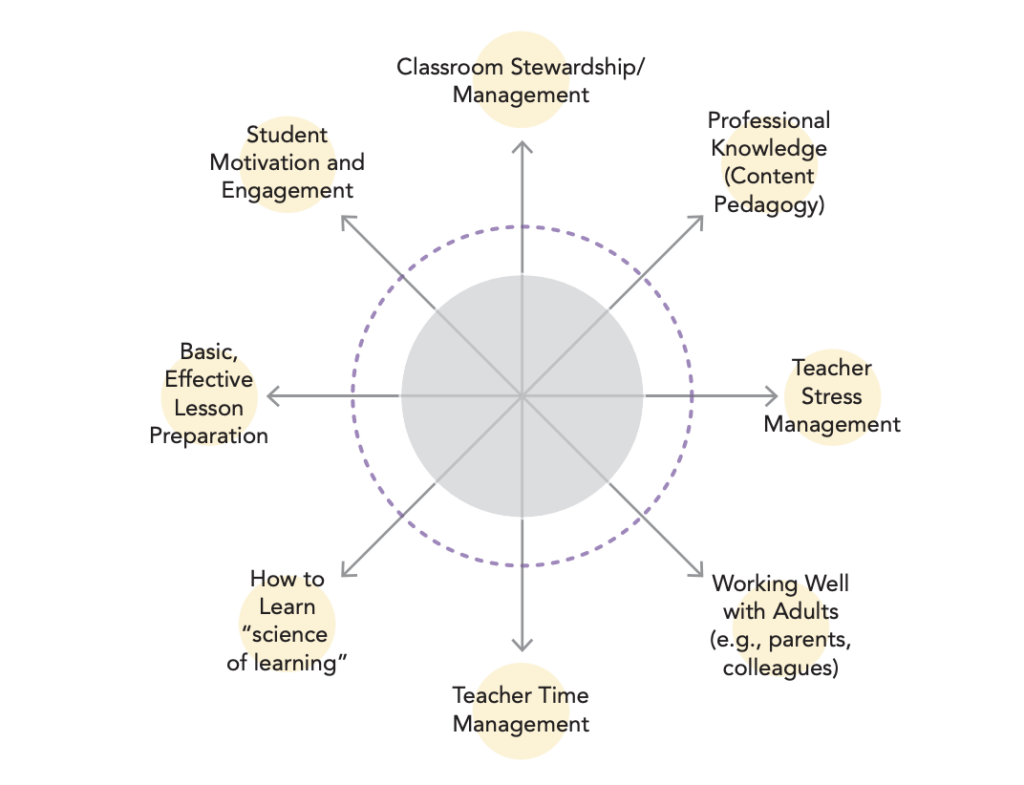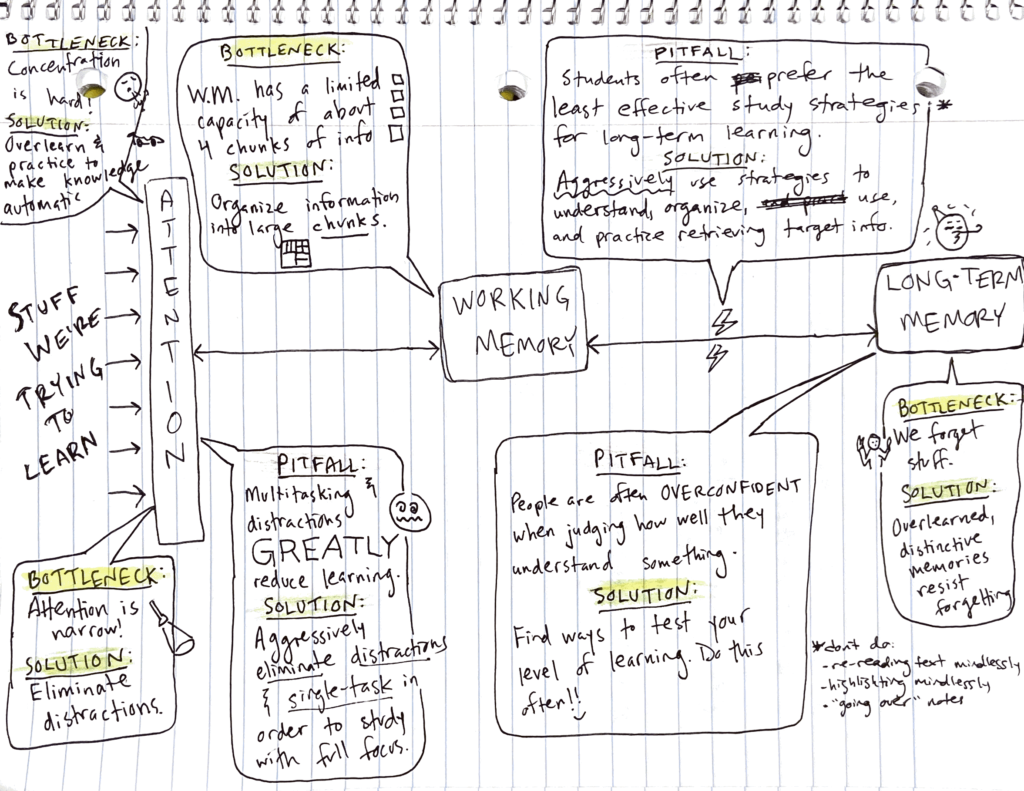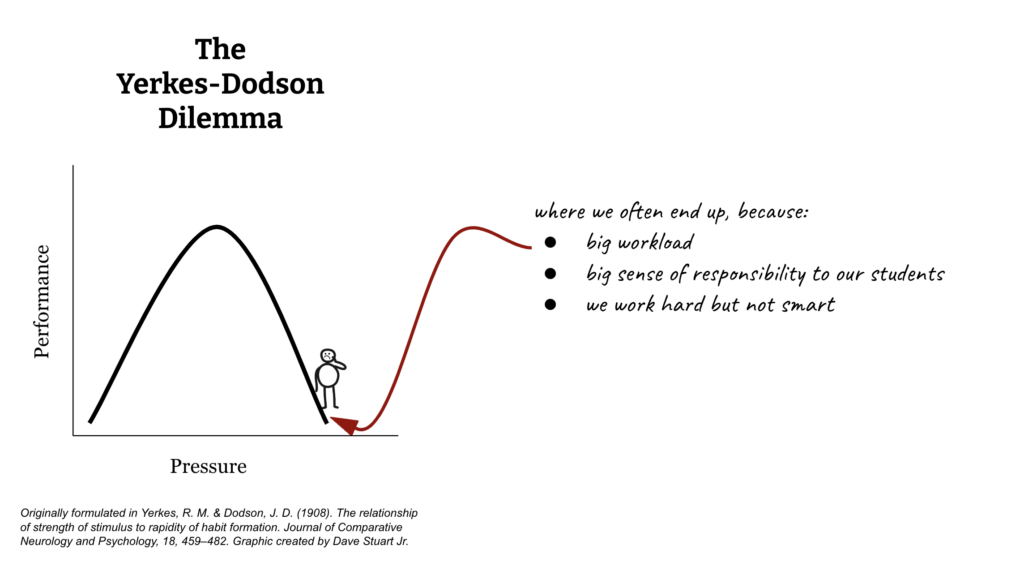Hi there! If you're here that means you're interested in digging deeper into Strategy 2: Improve at One Thing.

When first drafting the book, I attempted to treat each of the core competency areas for Credibility (above) with their own section. Unfortunately, this started making Strategy 2 feel like a bit of a slog — after all, each of the above areas could be a book unto itself. (And below, I've got a list of recommended books for each area.)
In Strategy 2, I treat Classroom Stewardship and Basic, Effective Lesson Prep. So on this page, we'll treat the other six.
How to Learn / Science of learning
There are several concepts that have born great fruit in my practice as I've studied and practiced them. These are most concisely summarized in my article series of “Learning Lessons, which you can find here. There are eight lessons in total, and walking through them should give you a very strong sense of Dr. Stephen Chew's bottlenecks for learning.

(The graphic above will make more sense after you read the article series.)
Dig Deeper recommendations:
- If you can only read one more book, try Dan Willingham's Why Don't Students Like School.
- If you can read one more, Pooja Agarwhal and Patrice Bain's Powerful Teaching is also excellent.
Teacher Time Management
When talking with teachers about time management over the years and developing my own system, I come again and again to the need for a few simple tools:
- a work schedule, which puts into practice the concept of constraints-based productivity;
- satisficing, which is basically a way to practice the reality that not everything is as important as everything else;
- resting; and
- thinking clearly about grading and feedback.
Dig Deeper recommendations:
- My Time Management Course for Teachers, and
- Oliver Burkeman's 4000 Weeks. (Just get it.)
Working Well with Adults
If the adults in this job drive you nuts, then not matter how much you love the students you're going to grow bitter. In my view, this isn't work you can do “just for the kids.” It's interdependent work. And so, there are certain approaches to working with colleagues, bosses, and parents that I find invaluable. The following articles are my in-depth take on these ideas.
- Working Better with Parents
- Here's a bit more on one of the key concepts of working with all adults (humility); please note that when I talk about humility I'm not being a moralist so much as a pragmatist; humility just makes sense in our job — AND it's one of the hardest things in our job, including for me.
- 14 Tips Toward Better Relationships with Admin, Parents, and Support Staff
- 9 Principles for Working Better with Fellow Educators
I know that list above looks like a paltry contribution to this complex topic, but trust me — the tips and principles in those articles is why I am competent in working with adults. Competence doesn't mean you're perfect — it means you know what to do when things go wrong. And: that you know how to avoid things going wrong much of the time.
Dig Deeper recommendations:
- Someday I'd like to make a mini-course on “getting along with adults,” but right now I don't have anything besides the articles above.
Teacher Stress Management
This topic ties in so closely to the time management topic above. When you're constantly feeling that sense of a being a tautly stretched-out rubber band with too much to do, that's chronic stress. It leads to burnout. And: it leads to decreased performance in your job because you, like every other human being, can only take so much.

So in addition to the stuff we've covered re: time management, I think what makes sense here is to list a few methods for personal depressurization that can give you and I clarity when we're in the midst of stress.
- Exercise — not to look a certain way but to depressurize the body;
- Emotionally honest relationships — either in professionally supervised or informal settings;
- Judgelessness, via Mr. Rogers;
- How to calm down hostile written communications using BIFF;
- How to overcome bedtime revenge and get better sleep.
Professional Knowledge
There are two kinds of professional knowledge — content and pedagogical. These need to be approached separately.
For both content and pedagogical professional knowledge, I've found people reach competency faster when they balance their learning between traditional learning modes (reading books, attending PDs, taking courses) and experiential learning (namely, observing folks in your building).
For content-specific professional knowledge, the best things you can do are:
- ask folks in your department or from your school of education what books made the greatest difference on them as teachers of their content (math, science, etc);
- watch folks in your department or school system who are known for being exceptionally good at teaching their content.
For pedagogical professional knowledge, I'd spend the year reading and applying either Mike Schmoker's Focus, Jo Facer's Simplicity Rules, or my own These 6 Things.
Student Motivation and Engagement
Since the entirety of The Will to Learn focuses on Student Motivation, here I'll just address engagement.
The most important thing to realize re: student engagement is that it's not the same thing as student motivation. Often these words are used interchangeably, but they are very different. In the video below, I pretty quickly explain this difference:
Here's more:
The Surprisingly Similar Troubles with Strategies Based on Coercion or Engagement
Dig Deeper recommendations:
- I'd spend the year reading and applying either Mike Schmoker's Focus, Jo Facer's Simplicity Rules, or my own These 6 Things
Get the latest
I'm always updating my blog and building on the many themes that this webpage addresses. To get my short, teacher-minded articles straight in your inbox as soon as they come out, just subscriber here.